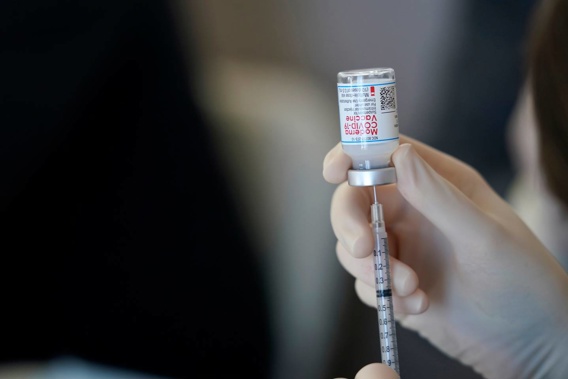
Iceland is experiencing its worst Covid-19 pandemic outbreak.
That's despite near-total vaccination levels. And what Delta's doing there may now be a sign of things to come for others.
The small island nation of 357,000 citizens has become a case study of the effectiveness of vaccination against the Delta mutation.
Some 96 per cent of all Icelandic women over 16 have received at least one vaccine dose. The figure for men is about 90 per cent.
In total, 86 per cent of the population has been fully vaccinated.
It is an outstanding result – so much so, the Reykjavík government felt it had this pandemic beaten.
In June, it rolled back social distancing, mask and travel restrictions.
But those restrictions have been reimposed as a Covid-19 Delta outbreak has sent case numbers soaring.
And even with a significantly reduced rate of severe illness, the outbreak is seriously straining the tiny nation's health system.
Reykjavik's raw numbers
A public address by epidemiologist Kamilla Jósefsdóttir in the capital Reykjavík late last week laid out the stark situation.
Iceland's medical infrastructure is being pushed to its limits. Contact tracing will become impossible if the rate of Delta's spread continues to grow, she warned. And this would trigger yet another spike in the infection rate.
She was one of a panel of experts warning local media that even the dramatically reduced percentage of critical cases might not be enough to save Iceland's healthcare system.
A month ago, the country had just two active Covid-19 cases.
Now, the sparsely populated island has more than 1590 active cases. About 20 are in hospital, with a quarter of those in intensive care. While that doesn't sound like many, in such a small country even that number puts a strain on its healthcare resources.
"A significant number of people are at risk of needing hospitalisation due to Covid-19 at the moment," Jósefsdóttir told reporters.
But the director of the National University Hospital, Páll Matthíasson, warned his hospital's staff were "burnt out" and that there were already Covid cases waiting for beds.
Staff shortages meant expanding treatment facilities was proving a challenge.
"Previous experience and data tell us that this wave has not reached its peak yet," Matthíasson warned.
Reykjavík hospital data reveals infections remain proportionately far higher among the unvaccinated. But vaccination only offers moderate resistance to contracting the disease.
The big difference, however, is in the severity of the symptoms.
Previous outbreaks of non-Delta variants among much lower vaccination rates claimed 29 Icelandic lives. The latest outbreak – despite its size – has so far claimed none.
Vaccination arms race
Early indications are that the much-desired goal of vaccination-induced herd immunity remains out of reach. But it is limiting hospitalisation and death.
Iceland's government is not discouraged.
"Evidence shows that the vaccines used in Iceland protect about 60 per cent of those fully vaccinated against any kind of infection caused by the Delta variant of the virus and over 90 per cent against serious illnesses," director general Bryndís Kjartansdóttir said.
"About 97 per cent of those infected have mild or no symptoms."
Meanwhile, Iceland is racing to prepare a rollout of the Pfizer vaccine among 12 to 15-year-olds.
It's doing this to both limit Delta's more severe effects among the young and to reduce the rate of spread.
But it's also reintroducing travel and social distancing restrictions.
And masks are again mandatory.
Such measures had been lifted in June once vaccinations had reached an acceptable level.
But vaccination hasn't proved to be the silver bullet many hoped it to be.
"This and other pandemics are here to stay," Matthíasson told the Icelandic community.
"We must strengthen the healthcare system so that it is not always on the brink of collapse. We are all in the same boat in this society. It's a pretty good boat despite everything, but we must work together to ensure success."
Body battlefield
A Public Health England (PHE) study found both the Oxford-AstraZeneca and Pfizer-BioNTech vaccines effective against Delta variant hospitalisation. And the UK's Delta infection rate has begun to fall.
But, last week, the Centres for Disease Control and Prevention (CDC) in the US published a new case study of a Delta outbreak in Provincetown, Massachusetts.
It prompted the CDC to advise even fully vaccinated people to continue wearing masks.
About 75 per cent of those who contracted Delta in that town were fully vaccinated. About 470 cases were detected. Five were hospitalised. None died.
But the study found the same levels of Covid Delta virus living in the noses and throats of both the vaccinated and unvaccinated.
That may be because existing vaccines are good at generating antibodies in the body's bloodstream, but not the mucus membranes of the nose and throat.
And that may cause a delay in the body's immune response – creating a window where Delta can replicate and spread.
But a separate Singapore study indicates that a vaccinated immune response accelerates much faster once it realises the infection is present. This produces a rapid drop-off of Delta viral loads a few days into the disease, and that reduces symptoms.
The upshot of both studies is that Delta is beaten back by vaccines – but only after it has had enough time to infect others.
Take your Radio, Podcasts and Music with you








